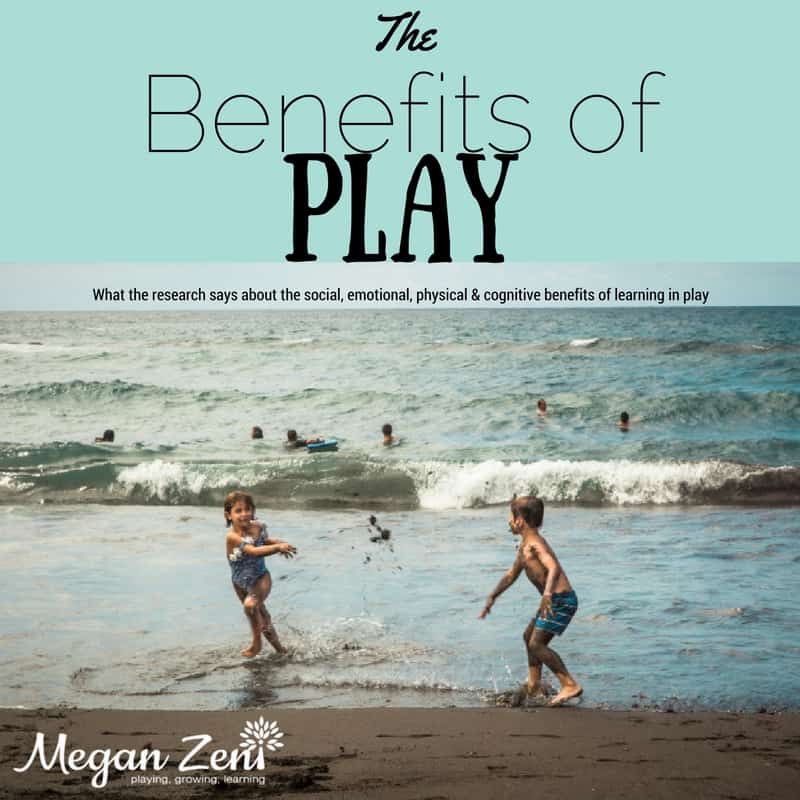- filed under: Family Life, Play Research
The Benefits of Play
If you’ve ever wondered what the secret sauce is for parenting high performing and likeable kids, you might want to learn more about the science of play. In a nutshell, the “Science of Play” is the collected wisdom and data about the benefits of play for kids and how it positively impacts their social, emotional, physical and cognitive development. That’s a lot to talk about, so let’s unpack it a bit:
Social Benefits of Play:
We don’t know who coined the phrase “science of play” but it can likely be attributed to Dr. Stewart Brown who has been a researcher in the field for decades. You can watch his TED talk and my summary of his talk here. Brown’s Science of Play includes the evolutionary purpose of play. He states that “In a world continuously presenting unique challenges and ambiguity, play prepares them [children] for an evolving planet.” You can read a great interview with him here for a deeper understanding of his theories. We also appreciate Peter Gray’s TED talk on the decline of play. You can watch it and read my review here. Gray discusses how play deprivation results in an over reaction of fear and a lack of ability to respond to social signals.
The big take away? Researcher Jaak Panksepp believes that optimal brain development depends on healthy play experiences in early life, and his findings support Dr. Brown’s statement that over the long evolutionary haul, play develops positive social bonds and social learning.
amzn_assoc_placement = “adunit0”;
amzn_assoc_search_bar = “true”;
amzn_assoc_tracking_id = “roomtoplay07-20”;
amzn_assoc_ad_mode = “manual”;
amzn_assoc_ad_type = “smart”;
amzn_assoc_marketplace = “amazon”;
amzn_assoc_region = “US”;
amzn_assoc_title = “My Amazon Picks”;
amzn_assoc_linkid = “a574790162056eec048de66968b3677c”;
amzn_assoc_asins = “1583333789,0465084990,0470574755,1626253730”;
Emotional Benefits of Play:
I’ve written quite a bit about the tension reduction and opportunities for emotional expression in play before. You can read my blog about the benefits of dress up play here. Essentially, children work out the stress and frustration of their day through imaginative play, which can provide opportunities to practice communicating in challenging relationships from the adult world around them. An emerging understanding of conscience develops through dress up play, and studies have shown that children who engage in role play end up learning empathy (because they can literally imagine what it might be like to walk in someone else’s shoes). Self-regulation is another skill learned through play and has a positive effect on emotional health. Read more about the importance of self-regulation on my post here.
The big take away? Play teaches children what is fair and not fair while in fantasy mode. Children can role play to work out the frustrations and limitations of their real lives. Empathy is learned through social and interactive play.
Physical Benefits of Play:
Jane Goodall once observed that “Play teaches young animals what they can and cannot do at a time when they are relatively free from the survival pressures of adult life.” What a great summation of the value of play in the lives of children! We know that play prepares us for the ever changing world and that it is critical for the complex and intricate social interactions humans have. But it also develops life skills that are used well beyond childhood: fine and gross motor skills as well as self-help skills that empower children to take risks and learn from their mistakes. Increasingly we are seeing research that advocates for risky play opportunities and the positive outcomes derived from risky play, including decreased anxiety and depression. You can read more about risky play here, and connect with researchers from across Canada interested in outdoor play here.
The big take away? Physical activity is good for kids no matter which way you slice it. Advocates for risky play suggest that the local playground is good, but getting out into nature and learning to climb, fall and jump on and off stuff without restrictions might be better.
Cognitive Benefits of Play:
The cognitive benefits of play have been studied for decades and the findings are too vast to report in one brief post. Rest assured that creative and open-ended play allows children the freedom to express their imaginations in a way that teaches the brain to be flexible. Fantasy play and imaginative role-playing are well established precursors to divergent and original problem solving later in life; skills that are well recognized in highly effective students. Alison Gopnik wrote in Smithsonian Magazine that, “we found children who were better at pretending could reason better about counterfactuals—they were better at thinking about different possibilities. They imagine ways the world could work and predict the pattern of data that would follow if their theories were true, and then compare that pattern with the pattern they actually see.” Read the full article here.
The big take away? Play triggers brain growth, and children provided with regular opportunities for unstructured play improved academic outcomes. Play is crucial for future problem solving and divergent thinking.
I love talking about play! If you would like me to speak to your parent group or staff about the importance of play, contact me here for speaking rates and availability.

Want more inspiration? Check out my curated Pinterest boards on play research here:
